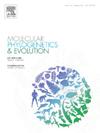Phylogenomic workflow for uncultivable microbial eukaryotes using single-cell RNA sequencing − A case study with planktonic ciliates (Ciliophora, Oligotrichea)
IF 3.6
1区 生物学
Q2 BIOCHEMISTRY & MOLECULAR BIOLOGY
引用次数: 0
Abstract
Phylogenetic analyses increasingly rely on genomic and transcriptomic data to produce better supported inferences on the evolutionary relationships among microbial eukaryotes. Such phylogenomic analyses, however, require robust workflows, bioinformatic expertise and computational power. Microbial eukaryotes pose additional challenges given the complexity of their genomes and the presence of non-target sequences (e.g., symbionts, prey) in data obtained from single cells of uncultivable lineages. To address these challenges, we developed a phylogenomic workflow based on single-cell RNA sequencing, integrating all essential steps from cell isolation to data curation and species tree inference. We assessed our workflow by using publicly available and newly generated transcriptomes (11 and 28, respectively) from the Oligotrichea, a diverse group of marine planktonic ciliates. This group’s phylogenetic relationships have been relatively well-studied based on ribosomal RNA gene markers, which we reconstructed by read mapping of transcriptome sequences and compared to our phylogenomic inferences. We also compared phylogenomic analyses based on single-copy protein-coding genes (well-curated orthologs) and multi-copy genes (including paralogs) by sequence concatenation and a coalescence approach (Asteroid), respectively. Finally, using subsets of up to 1,014 gene families (GFs), we assessed the influence of missing data in our phylogenomic inferences. All our analyses yielded similar results, and most inferred relationships were consistent and well-supported. Overall, we found that Asteroid provides robust support for species tree inferences, while simplifying curation steps, minimizing the effects of missing data and maximizing the number of GFs represented in the analyses. Our workflow can be adapted for phylogenomic analyses based on single-cell RNA sequencing of other uncultivable microbial eukaryotes.

利用单细胞 RNA 测序研究不可培养的微生物真核生物的系统发生学工作流程--浮游纤毛虫(纤毛虫纲,Oligotrichea)案例研究。
系统发生学分析越来越依赖于基因组和转录组数据,以更好地推断微生物真核生物之间的进化关系。然而,此类系统发生学分析需要强大的工作流程、生物信息学专业知识和计算能力。鉴于微生物真核生物基因组的复杂性,以及从不可培养品系单细胞获得的数据中存在非目标序列(如共生体、猎物),这给我们带来了额外的挑战。为了应对这些挑战,我们开发了基于单细胞RNA测序的系统发生组学工作流程,整合了从细胞分离到数据整理和物种树推断的所有基本步骤。我们使用公开的和新生成的转录组(分别为 11 个和 28 个)评估了我们的工作流程。基于核糖体 RNA 基因标记,我们通过对转录组序列的读图映射重建了该类纤毛虫的系统发生关系,并与我们的系统发生学推断进行了比较。我们还通过序列连接和聚合方法(Asteroid)分别比较了基于单拷贝蛋白编码基因(经过良好整合的直系同源物)和多拷贝基因(包括旁系同源物)的系统发生学分析。最后,我们利用多达 1,014 个基因家族(GFs)的子集,评估了缺失数据对系统发生学推断的影响。我们的所有分析都得出了相似的结果,大多数推断的关系都是一致的,并且得到了很好的支持。总之,我们发现 Asteroid 为物种树推断提供了强有力的支持,同时简化了整理步骤,最大限度地减少了缺失数据的影响,并最大限度地增加了分析中代表的 GFs 数量。我们的工作流程可用于基于其他不可培养微生物真核生物单细胞 RNA 测序的系统发生学分析。
本文章由计算机程序翻译,如有差异,请以英文原文为准。
求助全文
约1分钟内获得全文
求助全文
来源期刊
CiteScore
7.50
自引率
7.30%
发文量
249
审稿时长
7.5 months
期刊介绍:
Molecular Phylogenetics and Evolution is dedicated to bringing Darwin''s dream within grasp - to "have fairly true genealogical trees of each great kingdom of Nature." The journal provides a forum for molecular studies that advance our understanding of phylogeny and evolution, further the development of phylogenetically more accurate taxonomic classifications, and ultimately bring a unified classification for all the ramifying lines of life. Phylogeographic studies will be considered for publication if they offer EXCEPTIONAL theoretical or empirical advances.

 求助内容:
求助内容: 应助结果提醒方式:
应助结果提醒方式:


